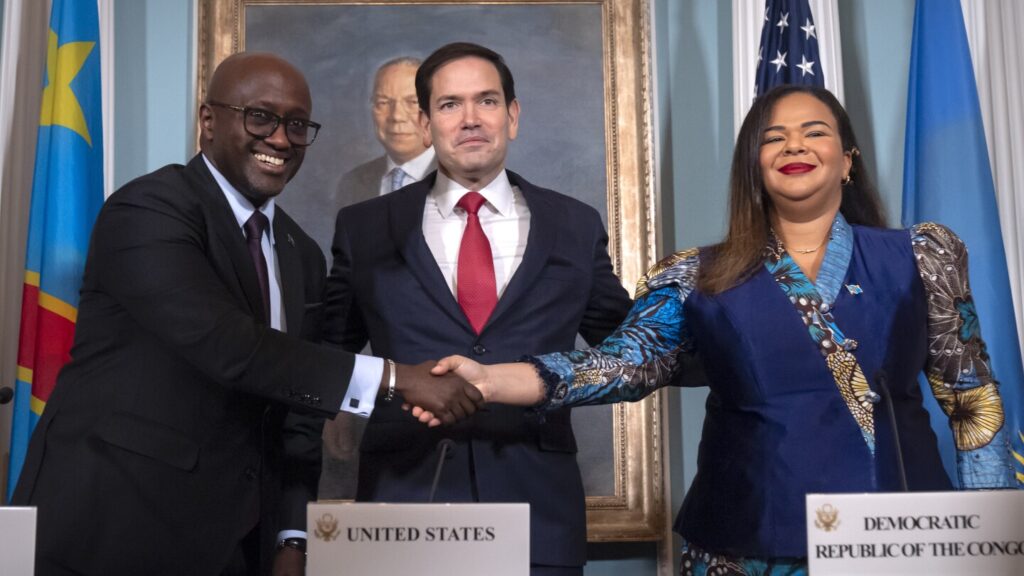
WASHINGTON (AP) — In a significant diplomatic breakthrough, the Democratic Republic of Congo and Rwanda signed a US-mediated peace deal on Friday, aimed at ending decades of deadly conflict in eastern Congo. The agreement, facilitated by the United States, also opens pathways for American companies to access critical minerals in the region, essential for modern technology.
“Today, the violence and destruction comes to an end, and the entire region begins a new chapter of hope and opportunity, harmony, prosperity and peace,” President Donald Trump announced to the foreign ministers of both nations during a meeting at the White House. The agreement was earlier signed in the State Department’s Treaty Room, under the watchful gaze of a portrait of Colin Powell, the first African American Secretary of State. Secretary of State Marco Rubio hailed it as “an important moment after 30 years of war.”
Historical Context of the Conflict
The Central African nation of Congo has been embroiled in conflict involving over 100 armed groups, with the most powerful factions allegedly backed by Rwanda. Since the 1990s, these conflicts have resulted in millions of deaths. While the peace deal is seen as a potential turning point, analysts caution that it may not immediately halt the violence, as the most prominent armed group claims the agreement does not apply to them.
Many Congolese view the deal as an opportunity for the US to secure critical minerals necessary for global technology, following Congo’s appeal to Trump for assistance in combating the rebels. This comes at a time when the US and China are vying for influence across Africa.
Diplomatic Efforts and Challenges
Congo’s Foreign Minister Therese Kayikwamba Wagner and Rwandan Foreign Minister Olivier Nduhungirehe signed the agreement, invoking the memory of millions of conflict victims. Both ministers expressed optimism but acknowledged the significant challenges ahead in ending the fighting.
“Some wounds will heal, but they will never fully disappear,” Wagner said. “Those who have suffered the most are watching. They are expecting this agreement to be respected, and we cannot fail them.”
Nduhungirehe highlighted the “great deal of uncertainty” due to past agreements failing to materialize. He emphasized the importance of continued support from the United States and other partners, noting Qatar’s role in facilitating the agreement at the US’s request.
The Complex Road Ahead
The agreement includes provisions on territorial integrity, the prohibition of hostilities, and the disarmament and conditional integration of non-state armed groups. However, the Rwanda-backed M23 rebel group, a major player in the conflict, has already suggested that the agreement is not binding for them. The group’s recent advances have exacerbated the humanitarian crisis, with the United Nations describing it as “one of the most protracted, complex, serious humanitarian crises on Earth.”
“The current draft agreement ignores war crimes and justice for victims by imposing a partnership between the victim and the aggressor,” said Christian Moleka, a political scientist at the Congolese think tank Dypol. “This seems like a trigger-happy proposition and cannot establish lasting peace without justice and reparation.”
Meanwhile, Rwanda has been accused of exploiting eastern Congo’s mineral wealth, which is crucial for products ranging from smartphones to advanced fighter jets. Although Rwanda denies these allegations, analysts suggest that such economic interests complicate the region’s dynamics.
The US Role and Global Implications
The US’s involvement in the peace process is seen as part of a broader strategy to counter China’s influence in Africa. For years, Chinese companies have dominated Congo’s mineral sector, with Chinese cobalt refineries heavily reliant on Congolese supply. The US Department of Commerce estimates the value of Congo’s untapped minerals at $24 trillion.
Congo’s foreign minister praised the US as a “reliable partner” during the peace negotiations and in broader bilateral relations. However, analysts warn that the US’s commitment could hinge on the extent of mineral access secured through separate negotiations.
In Congo’s North Kivu province, the epicenter of the conflict, there is cautious optimism about the peace deal’s potential to reduce violence. However, local activists stress the necessity of justice for lasting peace.
“I don’t think the Americans should be trusted 100%,” said Hope Muhinuka, an activist from North Kivu. “It is up to us to capitalize on all we have now as an opportunity.”
Looking Forward
The conflict’s roots trace back to the aftermath of the 1994 Rwandan genocide, which saw nearly 2 million Hutus flee into Congo, fearing reprisals from the Tutsi-led forces. This historical backdrop continues to influence the region’s geopolitics, as Rwanda accuses some Congolese factions of harboring genocide perpetrators.
As the peace deal unfolds, the international community will be closely watching how effectively it addresses the complex web of historical grievances, economic interests, and humanitarian needs. The path to peace remains fraught with challenges, but the agreement represents a hopeful step towards resolving one of the world’s longest-running conflicts.
___
Asadu reported from Dakar, Senegal. Edith M. Lederer at the United Nations, Justin Kabumba in Goma, Congo, Ignatius Ssuuna in Kigali, Rwanda, and Mike Pesoli and River Zhi-Hui Zhang in Washington contributed to this report.






